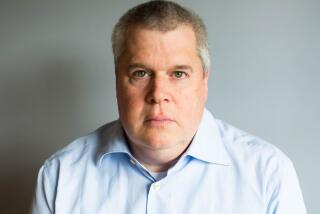Finding the Meaning in ‘Everyday Life’ : AN ANTHROPOLOGY OF EVERYDAY LIFE, <i> by Edward T. Hall,</i> Doubleday, $24.50; 269 pages
- Share via
While a student in Santa Fe, N.M., during the early 1930s, Edward T. Hall asked a Latino neighbor to do his laundry. But when he tried to find out how much he owed and offered her even more than the laundry downtown charged, she complained that it was not enough. Hall kept raising his bid, but his neighbor insisted on more. They finally settled on $5, a king’s ransom during the Depression.
Seventeen years later, arriving on State Department business in Beirut, Hall developed a theory about why his neighbor had been such a hard bargainer. A Middle East hand advised him that unless he settled all cab fares in advance, the cabdrivers’ expectations would be limitless.
Hall pondered the 800 years of Arab colonization in the Iberian Peninsula and deduced that his Latino neighbor in Santa Fe must have had the same cultural roots as the Arab Lebanese. Their concept of “price as language” differed from the North American, a subject of intercultural relations that triggers misunderstandings to this day.
By the time Hall arrived in Lebanon, he had intensely studied the cultural differences among the Navajo and Hopi in New Mexico, and the Micronesians, for his doctorate in anthropology. He was sent to Lebanon by the State Department’s Foreign Service Institute, which was preparing technicians and engineers to work in the Third World as part of a post-World War II development program.
With colleagues at the FSI, he developed the ideas about nonverbal communication that he published in 1959 as “The Silent Language,” a seminal work that has never gone out of print.
Now 33 years and seven books later, Hall has written his autobiography. “An Anthropology of Everyday Life” spans the period from his birth in St. Louis in 1914 through his completion of psychoanalysis in 1964. He describes the transition from living in a dysfunctional family to virtual abandonment and quasi-orphanhood at age 11.
It was that year, 1925, that his mother eloped with a sculptor and his father compounded her rejection by sending him to a series of progressive boarding schools in New Mexico, far from his younger brother and sisters.
He refers to himself as a “functional orphan,” first at these ranch schools and later at the public high school in Santa Fe, where he lived for three years with a scheming family of artists who had gulled his frugal but by no means poor father into boarding him. There he slept in an open shed, his “status reduced to that of the stepchildren in fairy tales.”
The real parents he longed for were far from benign. One of his earliest memories is being mauled by a German shepherd while his father and mother stood by. He learned then that “when the chips were down, my parents would not risk themselves in any way to save me.”
Hall’s father did provide his 13-year-old son with his own car (the boy had already been driving for three years) and later sent him to college.
During World War II, Hall joined a mostly African-American regiment and helped tackle the beaches at Normandy. He learned from working with them that “black culture was not to be seen as a substandard version of white culture, but as a genuine system unto itself with its own rules, patterns and conventions.”
After the war, Hall taught at Bennington College in Vermont, where he met another of the central figures in his life--the analyst Erich Fromm, who had just written “The Art of Loving.”
From Vermont, Hall went to Washington, D.C., to head a new FSI program at the State Department. In Washington, he joined a circle of psychoanalysts and scholars, including the late Justice Abe Fortas, whom he describes with warmth and vigor. The emotional and psychological pressures of McCarthyism led Hall to enter analysis, the seven-year internal journey with which Hall ends this memoir.
Some may quarrel with the psychoanalytic dogma to which Hall subscribes in these pages. He concludes, for instance, that his “entire life has been therapeutic,” parental abandonment included.
But in describing the vicissitudes of his early efforts to win academic recognition and in teasing out anthropological insights from everyday life, Hall accomplishes both of autobiography’s traditional goals: setting the record straight and finding some meaning or pattern in life.
Next: Jonathan Kirsch reviews “House of Cards” by Jon Friedman and John Meehan (Putnam’s).
More to Read
Sign up for Essential California
The most important California stories and recommendations in your inbox every morning.
You may occasionally receive promotional content from the Los Angeles Times.













